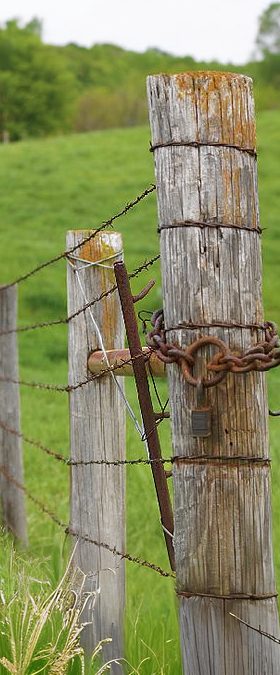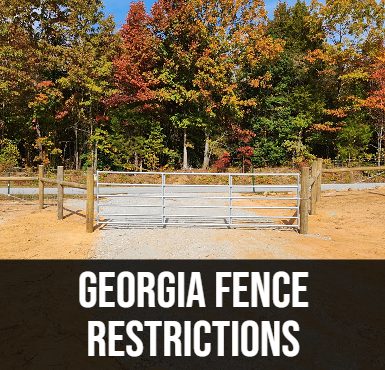
Overview of Georgia Fence Laws
When it comes to installing a fence in Georgia, you might think it’s as simple as sinking some posts and calling it a day. Well, buckle up, because there’s a bit more to it than that! There’s always Pros & Cons of Buying Land in Georgia, especially if there is an annoying neighbor next door. Understanding Georgia’s fence laws can save you from some serious neighborly drama and potential legal headaches. Let’s dive into the nitty-gritty, with a sprinkle of humor to keep things lively.
Building a fence isn’t just about keeping your dog from running off or adding some curb appeal to your property—it’s also about following the rules. Georgia’s fence laws can be a bit like an unexpected plot twist in a reality TV show; just when you think you know what’s coming, a new regulation pops up. Don’t worry, though—by the end of this guide, you’ll be as confident in your fencing knowledge as a carpenter with a brand-new nail gun.

Key Georgia State Laws Regarding Fences
Overview of Statewide Regulations
Georgia doesn’t have a one-size-fits-all law for fences. Instead, the state leaves much of the regulation to local governments. However, there are still a few state laws you should be aware of. For example, trespassing laws are in place to prevent your neighbor from getting a little too cozy with your backyard BBQs, and property damage laws can come into play if a rogue tree branch—or fence panel—decides to wreak havoc on someone else’s property.
Local Ordinances and Variations
Now, this is where things get interesting. Depending on where you live—whether it’s the bustling streets of Atlanta or the quiet lanes of rural Georgia—your local government might have specific ordinances that affect everything from fence height to the type of materials you can use. So before you start dreaming of a ten-foot fortress, you might want to check in with your local zoning office.
Understanding Property Line Regulations in Georgia
Defining Property Boundaries
Before you start digging holes, you need to know exactly where your property ends and your neighbor’s begins. Think of it as marking your territory—but without the messy business of, well, you know. The best way to avoid disputes is to have a professional surveyor define your property lines. It might cost a bit, but that’s nothing compared to the cost of tearing down and rebuilding a fence because you accidentally annexed part of your neighbor’s lawn.
Co-Ownership of Boundary Fences
If you’re planning to build a fence right on the property line, get ready to make friends with your neighbor—whether you like it or not. In Georgia, fences on the boundary line are generally co-owned, meaning both you and your neighbor are responsible for maintaining it. If your neighbor’s taste runs more toward white picket than wrought iron, you might have some negotiating to do.
Permits & Legal Requirements
Do You Need a Permit for Your Fence?
Here’s the deal: not every fence project requires a permit, but many do. For instance, if you’re planning on building a fence over six feet tall or using materials that aren’t exactly standard (looking at you, scrap metal artists), you’ll likely need to get the thumbs up from your local government. The last thing you want is to build your dream fence only to find out it’s a legal no-go.
Special Considerations for Fencing Projects
Planning to build a fence around a swimming pool? You might have some additional rules to follow, like making sure the fence is high enough to keep out the neighborhood kids—or the occasional alligator, if you’re down in the swamps. Historic districts might have their own set of quirky regulations too, so do your homework before you break ground.
Fence Height & Material Restrictions
Typical Height Restrictions
In most Georgia cities, you’re looking at a maximum fence height of six feet for the sides and back of your property, with the front typically capped at four feet. This isn’t just to keep the place looking tidy—taller fences can block sightlines for drivers and create safety hazards.
Approved & Prohibited Materials
Your choice of materials isn’t just about aesthetics. Some communities are picky about what you can and can’t use. Chain link fences might be fine in the backyard, but your front yard could be another story. Some neighborhoods insist on more ornamental materials like wrought iron or vinyl. Before you fall in love with a particular design, make sure it’s allowed in your area.

Resolving Fence Disputes with Neighbors
Common Disputes & How to Avoid Them
Fence disputes are as old as the fences themselves. Whether it’s about the height, the style, or just where the darn thing is placed, arguments can pop up faster than dandelions in spring. The best way to avoid trouble? Communicate. Talk to your neighbors before you build, and you might just avoid a shouting match over the garden hedge.
Legal Remedies for Encroachment
If your neighbor decides to push the limits—literally—and their fence encroaches on your property, you’ve got a few options. A friendly chat might do the trick, but if that doesn’t work, you might need to get a lawyer involved. Document everything, and if push comes to shove, you can take the matter to court.
Steps to Take Before Installing a Fence in Georgia
Check Local Ordinances & HOA Rules
Before you even think about buying that new fence, check with your local government and homeowners association (if you have one). Each might have its own set of rules that could affect your plans. You wouldn’t want to install a fence only to find out it’s two inches too close to the sidewalk.
Consulting with Professionals
Sure, you could DIY your fence, but why risk it? Professional installers know the ins and outs of local laws and can help you avoid common pitfalls. Plus, they’re a lot less likely to leave you with a fence that leans like the Tower of Pisa.
Conclusion to Navigating Georgia’s Fence Laws
Navigating the maze of Georgia fence laws might seem daunting at first, but with a bit of knowledge and some careful planning, you can avoid potential pitfalls and neighborly disputes. Whether you’re fencing in your prized petunias, establishing a little more privacy, or simply marking your territory like a modern-day pioneer, understanding the rules is crucial.
Remember, a well-built fence does more than just keep the world out—it keeps the peace within. By familiarizing yourself with local ordinances, respecting property lines, and maintaining open communication with your neighbors, you’ll not only stay on the right side of the law but also foster good relationships with those who share your boundaries. And let’s face it, a fence that doesn’t spark a neighborhood feud is worth its weight in gold!
If you’re feeling overwhelmed by all the details, then it might be worth asking if Selling Inherited Land in Georgia is your best bet. Also, professionals can help you navigate the legal landscape, ensure your fence is up to code, and save you from those dreaded “fence fail” moments that could otherwise result in costly corrections.
Ultimately, building a fence in Georgia is about more than just following rules—it’s about creating a space that reflects your needs and respects those of your community. So go ahead, get that fence up! Just make sure it’s a legal, well-placed, and neighbor-approved masterpiece. After all, the best fences don’t just make good neighbors—they make happy ones too.
Frequently Asked Questions (FAQs)

1. Do I Need a Permit to Build a Fence in Georgia?
Whether you need a permit depends on your local municipality’s regulations. In many areas, a permit is required if your fence exceeds a certain height (typically six feet) or if it’s being built in a special district, such as a historic area. It’s always best to check with your local zoning office or homeowners association (HOA) before starting your project to avoid any surprises.
2. How Close to My Property Line Can I Build a Fence?
In Georgia, there are no statewide rules regarding how close a fence can be to a property line. However, local ordinances may require a setback or space between the fence and the property line, typically ranging from 2 to 8 inches. If you’re building on the property line itself, you may need your neighbor’s consent, as the fence will be jointly owned.
3. What Are the Height Restrictions for Fences in Georgia?
Most local ordinances in Georgia restrict fence heights to a maximum of six feet for the sides and back of the property, and four feet for the front yard. These restrictions help maintain visibility for drivers and ensure that fences fit within the aesthetic of the neighborhood.
4. Who Is Responsible for Maintaining a Boundary Fence in Georgia?
If a fence is built on the property line, it is generally considered jointly owned by both neighbors. This means that both parties are responsible for the fence’s maintenance and any decisions regarding its repair or replacement. If the fence is built entirely on one property, the owner of that property is solely responsible for its upkeep.
5. What Should I Do if My Neighbor’s Fence Encroaches on My Property?
If you believe your neighbor’s fence encroaches on your property, the first step is to have a conversation with them. If the issue cannot be resolved amicably, you may need to get a professional survey to confirm property boundaries. In some cases, legal action may be necessary to resolve the dispute, but this should be considered a last resort.